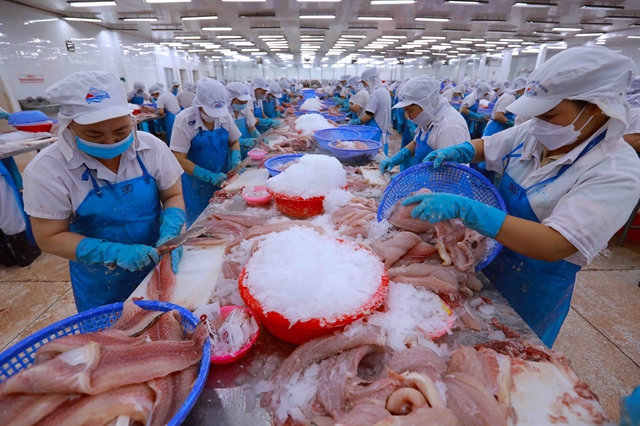Rather than viewing each other as competitors, many entrepreneurs are learning to support one another by sharing resources, opportunities, and knowledge, creating a collective strength that helps them navigate uncertainty.

In the face of a volatile global economy, Vietnamese businesses, particularly small- and medium-sized enterprises, are increasingly embracing a new philosophy of doing business -- one that places symbiosis, connection and collaboration at its core.
Rather than viewing each other as competitors, many entrepreneurs are learning to support one another by sharing resources, opportunities and knowledge, creating a collective strength that helps them navigate uncertainty.
For years, the traditional model of competition ruled the business landscape. Companies vied for market share, customers and dominance, often operating in isolation. But in recent times, the risks posed by unpredictable pandemics, geopolitical tensions and economic shocks have forced many enterprises to rethink their approach.
It is becoming clear that no matter how strong a business is individually, it is difficult to thrive alone in today’s complex environment.

A growing number of Vietnamese businesspeople now believe that connection and co-operation are vital not only to survival but to long-term growth.
“No business can succeed in isolation anymore,” said Lê Minh Tuấn, chairman and CEO of Mikedu S, a company that supports business education and networking. “We have to move from competition to collaboration if we want to build a sustainable future.”
This mindset is evident in the activities of networks such as the International Business Networking Organisation (IBNO), which brings together thousands of entrepreneurs across sectors and regions. These networks do more than provide platforms to exchange business cards; they foster genuine relationships rooted in trust and shared values.
One compelling example is Goldtrans, a freight forwarding and logistics company. Before joining IBNO, Goldtrans relied heavily on traditional advertising and sporadic social contacts to attract new customers. These methods proved costly and time-consuming, with long sales cycles as potential clients hesitated to trust a company they did not know well.
Since becoming part of the business network, the company has witnessed a transformation.
“Most of our new customers now come from trusted referrals,” said Nguyễn Thị Hoa, director of Goldtrans.
“This has shortened our sales cycle dramatically and lowered our marketing expenses. The trust established through the network carries significant weight.”

The benefits of such connections became even more apparent during the pandemic, when countless businesses faced severe disruption. The Quán Huế restaurant chain, operating in Hà Nội and Hưng Yên, saw its revenue nearly vanish as social distancing rules forced eateries to close to diners.
Yet, thanks to the support of fellow entrepreneurs in her network, founder and CEO Đỗ Thị Phương found ways to survive.
Food suppliers allowed her to delay payments, tech specialists volunteered to develop an online ordering platform quickly, and other business owners purchased prepaid vouchers to support cash flow.
“Without this community, we would not have made it through the hardest months,” Phương said. “They didn’t just help financially, they gave me hope and motivation.”
The spirit of symbiosis extends beyond support in crisis to deeper collaboration. Nam Việt Furniture, which exports wooden furniture to markets such as the US, Japan and the Middle East, faced a shipping logjam due to global geopolitical tensions.
The company Director Nguyễn Hoàng Phước recalled the anxiety of mounting costs and delayed deliveries.
"Through my network, I connected with a business partner who had available container space, enabling us to share shipping costs and reduce expenses by nearly 40 per cent," he said.
The group’s transparent sharing of market intelligence also helped Nam Việt Furniture adjust swiftly to evolving conditions.
These stories reflect a wider shift in Việt Nam’s business culture. Where once information was closely guarded and competition fierce, there is now a recognition that openness and mutual support can create a more resilient ecosystem.
“It is a mindset shift from scarcity to abundance,” said Đoàn Quang Thắng, regional director of IBNO in Hà Nội. “When businesses share, they multiply opportunities. It’s not just about making deals; it’s about building a family where members can lean on each other.”
This sense of belonging has intangible benefits. Running a business can be isolating and stressful, but networks provide a space for entrepreneurs to share their struggles, learn from others’ experiences, and find encouragement.
Thắng has noted that companies active in such networks tend to demonstrate more stable growth and greater ability to weather crises.
Despite playing a crucial role in the national economy, accounting for over 80 per cent of employment and around 30 per cent of GDP, many smaller businesses in the country face challenges such as limited access to financing and fluctuating market conditions. Symbiotic business relationships help offset some of these vulnerabilities by creating shared strengths.
Business leaders see symbiosis as more than a tactical response to current difficulties. They view it as a foundational strategy for future development, one that can drive innovation, foster sustainable growth, and enhance competitiveness.
Lê Minh Tuấn of Mikedu S said the collective power would be unlocked when businesses grow together.
“Each success in the network lifts the entire community,” he said. “It encourages continuous learning, innovation, and a spirit of generosity.”
Even industries known for intense competition, such as real estate and consumer goods, are beginning to adopt this approach. Joint marketing campaigns, shared customer referrals, and collaborative projects are becoming more common.
In an increasingly interconnected world where disruption is the norm, Việt Nam’s business community is proving that the best way forward is together. The symbiotic model -- built on trust, cooperation and shared growth -- is helping enterprises not only survive challenges but turn them into opportunities.
For many entrepreneurs, this means the difference between isolation and belonging, between uncertainty and confidence. As the economy continues to evolve, those who embrace symbiosis will likely lead the way.
“Success today doesn’t belong to the biggest or the loudest,” said Tuấn. “It belongs to those who listen, support, and grow as one.” VNS





